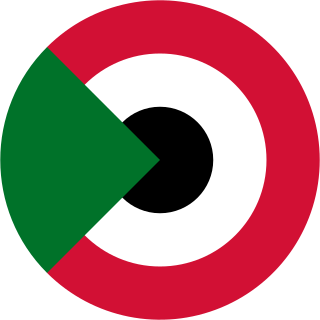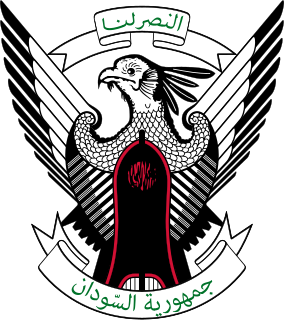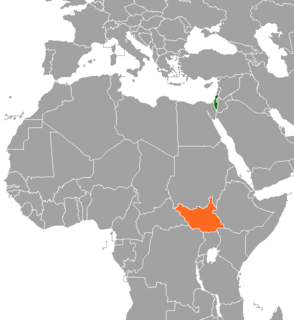
Sudan, officially the Republic of the Sudan, is a country in Northeast Africa. It borders the countries of Central African Republic, Chad, Egypt, Eritrea, Ethiopia, Libya, South Sudan, and the Red Sea. It has a population of 44.91 million people as of 2021 and occupies 1,886,068 square kilometres, making it Africa's third-largest country by area, and the third-largest by area in the Arab League. It was the largest country by area in Africa and the Arab League until the secession of South Sudan in 2011, since which both titles have been held by Algeria. Its capital is Khartoum and its most populated city is Omdurman.

Field Marshal Omar Hassan Ahmad Al-Bashir is a Sudanese former military officer, politician and alleged war criminal who served as the seventh head of state of Sudan under various titles from 1989 until 2019, when he was deposed in a coup d'état. He was subsequently incarcerated, tried and convicted on multiple corruption charges. He came to power in 1989 when, as a brigadier general in the Sudanese Army, he led a group of officers in a military coup that ousted the democratically elected government of prime minister Sadiq al-Mahdi after it began negotiations with rebels in the south. He was elected three times as President in elections that have been under scrutiny for electoral fraud. In 1992, al-Bashir founded the National Congress Party, which remained the dominant political party in the country until 2019. In March 2009, al-Bashir became the first sitting head of state to be indicted by the International Criminal Court (ICC), for allegedly directing a campaign of mass killing, rape, and pillage against civilians in Darfur. On 11 February 2020, the Sudanese government announced that it had agreed to hand over al-Bashir to the ICC for trial.

The Sudanese Air Force is the air force operated by the Republic of the Sudan. As such it is part of the Sudanese Armed Forces.

Salva Kiir Mayardit, also known as Salva Kiir, is a South Sudanese politician who has been President of South Sudan since its independence in 2011. Prior to independence, he was President of the Government of Southern Sudan, as well as First Vice President of Sudan, from 2005 to 2011. He was named Commander-in-Chief of the Sudan People's Liberation Army (SPLA) in 2005, following the death of John Garang.
Abdel Rahim Mohammed Hussein is a Sudanese politician and the former Governor of Khartoum State. Hussein served as the longstanding Minister of National Defense of The Republic of Sudan. Hussein also served for a period as the Minister of Interior Affairs. During his term as Minister of Interior Affairs, he opened the Rabat University.Hussein was arrested in early April 2019 following a coup on 11 April which overthrew al-Bashir.

The War in Darfur, also nicknamed the Land Cruiser War, is a major armed conflict in the Darfur region of Sudan that began in February 2003 when the Sudan Liberation Movement (SLM) and the Justice and Equality Movement (JEM) rebel groups began fighting against the government of Sudan, which they accused of oppressing Darfur's non-Arab population. The government responded to attacks by carrying out a campaign of ethnic cleansing against Darfur's non-Arabs. This resulted in the death of hundreds of thousands of civilians and the indictment of Sudan's president, Omar al-Bashir, for genocide, war crimes, and crimes against humanity by the International Criminal Court.

Christianity has a long history in the region that is now Sudan and South Sudan. Ancient Nubia was reached by Coptic Christianity by the 2nd century. The Coptic Church was later influenced by Greek Christianity, particularly during the Byzantine era. From the 7th century, the Christian Nubian kingdoms were threatened by the Islamic expansion, but the southernmost of these kingdoms, Alodia, survived until 1504.

Sudanese nomadic conflicts are non-state conflicts between rival nomadic tribes taking place in the territory of Sudan and, since 2011, South Sudan. Conflict between nomadic tribes in Sudan is common, with fights breaking out over scarce resources, including grazing land, cattle and drinking water. Some of the tribes involved in these clashes have been the Messiria, Maalia, Rizeigat and Bani Hussein Arabic tribes inhabiting Darfur and West Kordofan, and the Dinka, Nuer and Murle African ethnic groups inhabiting South Sudan. Conflicts have been fueled by other major wars taking place in the same regions, in particular the Second Sudanese Civil War, the War in Darfur and the Sudanese conflict in South Kordofan and Blue Nile.

Sudanese refugees in Israel refers to citizens of Sudan who have sought refuge in Israel due to military conflict at home, and to those who moved there illegally as migrant workers. In 2008, there were 4,000 Sudanese in Israel, 1,200 from Darfur and the remainder Christians from South Sudan. The majority entered through the Israeli-Egypt border. Most live in Tel Aviv, Arad, Eilat and Bnei Brak.

The 2011–2013 protests in Sudan began in January 2011 as part of the Arab Spring regional protest movement. Unlike in other Arab countries, popular uprisings in Sudan had succeeded in toppling the government prior to the Arab Spring in 1964 and 1985. Demonstrations in Sudan however were less common throughout the summer of 2011, during which South Sudan seceded from Sudan, but resumed in force later that year and again in June 2012, shortly after the government passed its much criticized austerity plan.

The Cabinet of Sudan usually refers to the chief executive body of the Republic of the Sudan. The Cabinet was dissolved following the 11 April 2019 Sudanese coup d'état. Chapter 5 of the August 2019 Draft Constitutional Declaration defines the procedures which led to the nomination of Abdalla Hamdok as Prime Minister, and up to 20 Ministers in the Cabinet, during late August 2019, for the 39-month democratic transition. The Sudanese Women's Union protested against this. Under Article 19 of the Draft Constitutional Declaration, the ministers of the Transitional Cabinet are ineligible to run in the election scheduled to follow the transition period.

The Sudanese conflict in South Kordofan and Blue Nile is an armed conflict in the Sudanese southern states of South Kordofan and Blue Nile between the Sudanese Army (SAF) and Sudan People's Liberation Movement-North (SPLM-N), a northern affiliate of the Sudan People's Liberation Movement (SPLM) in South Sudan. After some years of relative calm following the 2005 agreement which ended the second Sudanese civil war between the Sudanese government and SPLM rebels, fighting broke out again in the lead-up to South Sudan independence on 9 July 2011, starting in South Kordofan on 5 June and spreading to the neighboring Blue Nile state in September. SPLM-N, splitting from newly independent SPLM, took up arms against the inclusion of the two southern states in Sudan with no popular consultation and against the lack of democratic elections. The conflict is intertwined with the War in Darfur, since in November 2011 SPLM-N established a loose alliance with Darfuri rebels, called Sudan Revolutionary Front (SRF).

South Sudan, officially known as the Republic of South Sudan, is a landlocked country in east/central Africa. It is bordered to the east by Ethiopia, to the north by Sudan, to the west by the Central African Republic, to the southwest by Democratic Republic of the Congo, to the south by Uganda and to the southeast by Kenya. It has a population of 11.06 million, of which 525,953 live in the capital and largest city Juba.

The economy of South Sudan is one of the most oil dependent economies in the world, despite being endowed with bountiful natural resources. It has a very fertile agricultural land and vast number of livestock. The livestock include over 60 million cattle, sheep and goats. Political instability, poor governance, and corruption continue to hinder development in the world's youngest country.

Israel – South Sudan relations refers to the bilateral ties between the State of Israel and the Republic of South Sudan.

Pa'gan Amum Okiech is a South Sudanese politician. He is the co-founder of South Sudan Reborn, a political organisation that attempts to bring peace to South Sudan and is the primary spokesperson. He is also the head of the SPLM-Former Detainees (SPLM-FD).

The International Criminal Court investigation in Darfur or the situation in Darfur is an ongoing investigation by the International Criminal Court (ICC) into criminal acts committed during the War in Darfur. Although Sudan is not a state party to the Rome Statute, the treaty which created the ICC, the situation in Darfur was referred to the ICC's Prosecutor by the United Nations Security Council in 2005. As of June 2019, five suspects remained under indictment by the court: Ahmed Haroun, Ali Kushayb, Omar al-Bashir, Abdallah Banda and Abdel Rahim Mohammed Hussein. Charges against Bahar Abu Garda were dropped on the basis of insufficient evidence in 2010 and those against Saleh Jerbo were dropped following his death in 2013. In mid-April 2019, Haroun, al-Bashir and Hussein were imprisoned in Sudan as a result of the 2019 Sudanese coup d'état. In early November 2019, the Forces of Freedom and Change (FFC) and Sudanese Prime Minister Abdalla Hamdok stated that al-Bashir would be transferred to the ICC. One of the demands of the displaced people of Darfur visited by Hamdok prior to Hamdok's statement was that "Omar Al Bashir and the other wanted persons" had to be surrendered to the ICC.

The Heglig Crisis was a brief war fought between the countries of Sudan and South Sudan in 2012 over oil-rich regions between South Sudan's Unity and Sudan's South Kordofan states. South Sudan invaded and briefly occupied the small border town of Heglig before being pushed back by the Sudanese army. Small-scale clashes continued until an agreement on borders and natural resources was signed on 26 September, resolving most aspects of the conflict.
Atong Demach is a South Sudanese businesswoman and beauty queen. She won the Miss World South Sudan 2011 title and was later crowned as Miss World Africa and Miss World 3rd runner up in Ordos, China. The South Sudanese queen is the first representative of South Sudan to Miss World and the first to win the title of Miss World Africa. She now works as the government of South Sudan's ambassador for culture and a public relations advisor to the government of Japan.

Abdalla Hamdok Al-Kinani is a Sudanese public administrator who serves as the 15th Prime Minister of Sudan. Prior to his appointment, Hamdok served in numerous national and international administrative positions. From November 2011 to October 2018, he was Deputy Executive Secretary of the United Nations Economic Commission for Africa (UNECA). UNECA staff described Hamdok as "[a] diplomat, a humble man and a brilliant and disciplined mind". In August 2019, Hamdok was suggested as a likely candidate for Prime Minister of Sudan for the 2019 Sudanese transition to democracy.














